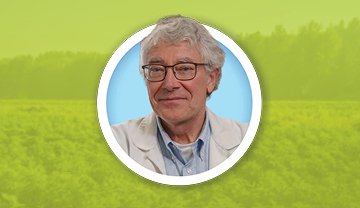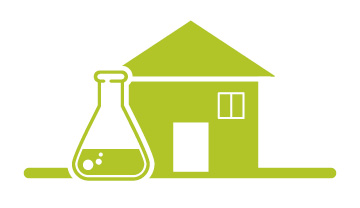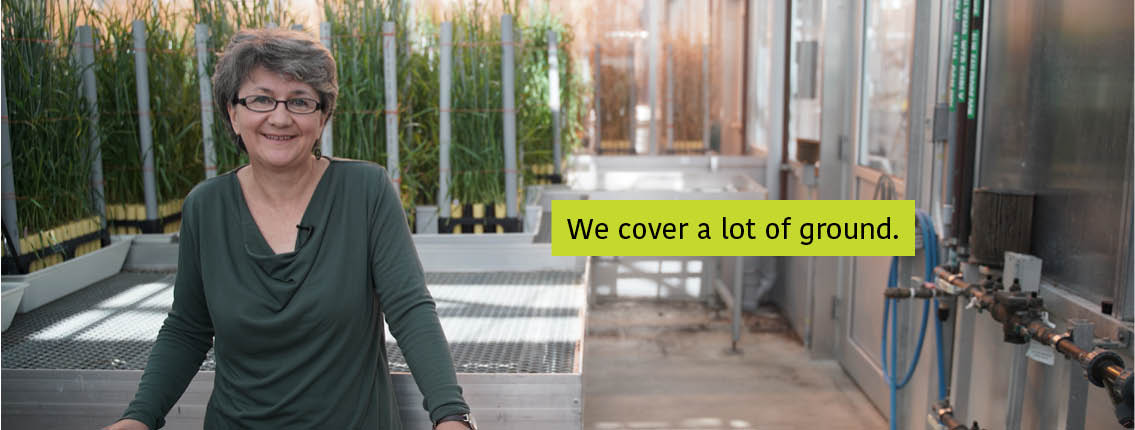
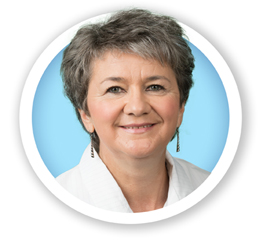
Dr. Sylvie Cloutier
Research Scientist – Molecular Geneticist
Ottawa Research and Development Centre
Why did you become a scientist?
I am a naturally inquisitive person who challenges just about everything. Being a scientist satisfies my curiosity and allows me to have a broad scope of decision making: from ideas and execution, to results and impact. This is highly rewarding.
Meet Dr. Sylvie Cloutier
Video transcript
*NOTE: This footage was recorded prior to the Government of Canada's physical distancing guidelines. Canadians are encouraged to continue to follow COVID-19 safety guidelines.
[Technological music starts.]
[Upbeat, technological music starts. Harvesting for vast fields of lettuce is underway.]
Sylvie Cloutier: 2% of the population produces all the food for everyone on Earth.
[A combine harvests rows of wheat.]
When we look at agriculture as a whole and the world population, wheat is one of the species that contributes 20% of the calories…
[Rows of bread are sold in a marketplace.]
… and 20% of the protein to feed the world.
[Sylvie Cloutier gives an interview in a greenhouse filled with wheat. Text appears next to a DNA icon.]
Text: Dr. Sylvie Cloutier, Research Scientist – Molecular Geneticist, Agriculture and Agri-Food Canada
My name is Sylvie Cloutier. I'm a molecular geneticist, and I work with wheat.
[Sylvie walks past rows of plant growth chambers. Text appears alongside a location icon.]
Text: Ottawa, Ontario
In wheat at the moment, we are seeing a shrinking of genetic diversity. About 100 years ago, 100 or 150 years ago, we started doing genetic improvement.
[Sylvie opens a plant growth chamber to reveal wheat samples inside.]
At first, farmers went into the fields and selected the plants that looked the best, and so on. In doing so, we often select for the things we want, but the things we want are the things we want today, now, in the environment…
[Sylvie uses tweezers to take samples of grains from the wheat.]
… and sometimes we left behind genes that would be very useful, but that we no longer have within the species. So, my role is to go back to these wild species and to look for the genetic diversity that is thought to be lost and to bring it back within the wheat species to help improve it.
[Combines crisscross through a wheat field at sunset.]
I think Canadians should be very proud of our contribution to food security around the world.
[Text appears on a white background with a green stripe.]
Text: Learn more at agr.gc.ca/fields-of-science. We cover a lot of ground.
[The Canada wordmark appears. The music fades out.]
Profile
What do you like the most about your job?
It is not boring—I could not do repetitive work—because the challenges are vast and constant. I get to shape my activities to a great extent because I drive change through generating ideas, proposing them, and so on. There is ongoing stimulation. While the sense of adventure is not for everyone, I find it exciting to constantly hover on the brink of something new.
What is the most common question people ask you about your work?
When people ask, "what do you do?" I tell them that I am a molecular geneticist and that I work on wheat and flax. That is usually a non-starter of a conversation.
What was the biggest challenge you ever encountered in your career?
The PhD program trains us in aspects of science, but we do not receive formal training in the soft skills that make us better managers, team players and leaders, for example. Yet, these skills are extremely important because to be a good scientist, one must exercise these and many more soft skills, which must be acquired and improved throughout one's career in order to be successful.
Who inspired your career or who is your Idol?
Dr. Frederick Sanger. He won not one, but two Nobel Prizes, including one for developing the methodology to sequence DNA. Yet, he was described as a humble person who held himself to the highest standards, and did not seek attention or wish for power.
What is your favorite food?
Bread, of course. Warm, steamy and buttered.
Canadian wheat: toasted by the world
Picture yourself waking up to warm toast slathered with creamy butter and sweet jam. Is there anything more delicious with your morning cup of hot coffee or tea?
Odds are, the wheat for your toast—and for breakfast enjoyed by millions of others around the world—is grown by Canadian farmers. And those farmers are supported by Agriculture and Agri-Food Canada (AAFC) researchers, like molecular geneticist Dr. Sylvie Cloutier.
"Canadian wheat feeds the world," says Dr. Cloutier. "Our international reputation for producing wheat of the highest quality makes me proud."
For more than 100 years, AAFC researchers have dedicated their careers to improving the yield and quality of wheat varieties grown in Canada. The results have paid off in spades.
Today, Canada is one of the world's largest exporters of wheat, with an annual harvest worth $5 billion. Canadian wheat is a huge part of the calories and protein consumed around the world every day.
But there's a problem: increasingly frequent weather woes, like flooding, droughts, diseases, and pests, make it harder for wheat and other crops to grow to a successful harvest.
That's where Dr. Cloutier's molecular savvy comes in. She's working to find what are called 'stress resistance genes' in the DNA of wild or less adapted wheats so that plant breeders can then incorporate them into current high-producing Canadian varieties that Canadian farmers love to grow.
Such genes occur naturally as different varieties adapt to their native environments and help a species survive. Some of these genes help the varieties better resist particular diseases or endure unfavourable growing conditions that promote disease.
Dr. Cloutier looks for stress resistance genes in other wheat populations, at home and abroad.
You can sometimes see evidence of resistance genes in fields where a few plants remain standing, after weather or disease has wiped out the rest.
At the molecular level, this research is a very detailed process. At times, it may seem like looking for the proverbial needle in the haystack.
But thanks to technology, better genetic screening tools are making it easier. By rediscovering this lost genetic diversity, we are improving food security on a global scale. Dr. Cloutier knows it's worth the effort—for Canada and the world.
More agriculture and agri-food science
Learn how a new feeding system helps Canadian pigs get the right amount of nutrients in every meal, which impacts animal well-being, is more beneficial to the environment and produces top-quality pork.
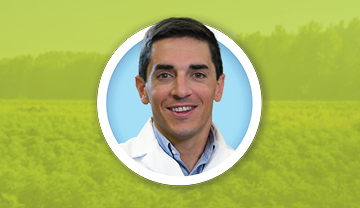
Find out how scientists are working to transform crop diseases into harmless anti toxins to better protect your food.
